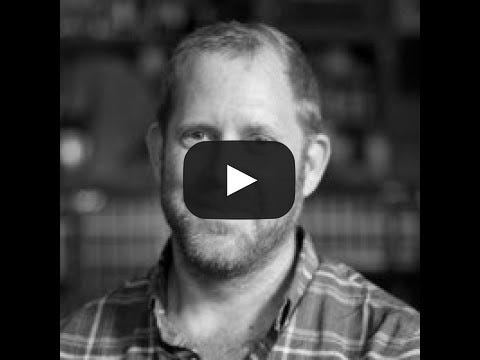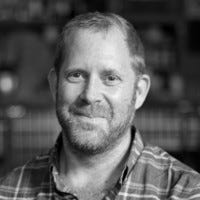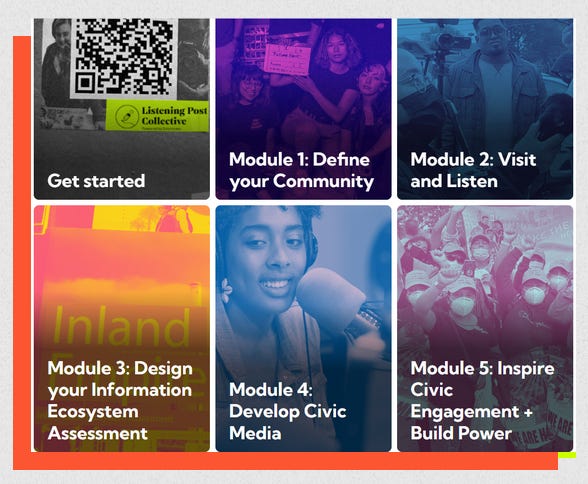You’re reading the My News Biz newsletter, which I will be sending you every other Thursday. My goal is to help you and other digital media entrepreneurs to find a viable business model that works for you. If you were forwarded this email, you can sign up here. Don’t trust the news media? He gets it—and has a planIt's all about journalists listening rather than lecturing, and recruiting community members to rebuild the newsYou’re reading the Your News Biz newsletter. My goal is to help digital media entrepreneurs and small businesses find viable business models. In a media environment flooded with misinformation and mistrust, journalist Jesse Hardman has spent the last two decades trying to answer a deceptively simple question: How do people actually get their news? He’s worked in public radio, done video reporting for Time magazine, and freelanced for NPR, Al Jazeera America, the Atlantic, and other outlets. His LinkedIn profile includes his work as a journalism trainer and community media developer on projects in Sri Lanka, Tunisia, Peru, Chile, Guatemala, Belize, and Pakistan, among other countries. He’s also been a professor at CUNY’s Graduate School of Journalism and Columbia University in New York. Jesse Hardman and I first met in Latin America nearly 20 years ago when we were both working as Knight Fellows training journalists and students — he in Peru, I in Bolivia. We became friends and have stayed in touch off and on over the years. Journalism without egoIn our recent conversation, Jesse reflected on his journey, the challenges facing journalism, and why listening—not lecturing—is the most powerful tool that media professionals have left to create trust. “I never lost the idea that the work I was doing overseas—listening to communities, understanding their needs—was just as relevant in the U.S.,” Jesse said. “We [journalists] have got to stop showing up with answers. Listening—real listening—is the strategy.” That insight led him to launch the Listening Post Collective in New Orleans in 2013. It’s a project of the nonprofit Internews, which provides media support in more than 100 countries. That first summer Jesse spent time talking with people in New Orleans’ mainly Black neighborhoods, asking them how they got information. He listened on front porches, at barbecues, at churches, in grocery stores, in barbershops, at street fairs — anywhere people gathered. That included asking how they shared information on their smartphones. Building trust where it matters mostWhat emerged from those conversations was a multi-platform experiment in community media. Hardman sent news updates via text, hosted conversations in person, and made use of public spaces to disseminate verified information. One day he received an emotionally moving voicemail in response to one of his texts, and he invited the caller to coffee. She was a Black postal worker and Hurricane Katrina survivor who explained to him why she chose not to vote—not out of apathy, but disillusionment. She didn’t believe voting would change her life. The irony is that the day she was having coffee with Jesse was election day 2016, when Donald Trump surprised everyone and beat Hillary Clinton. That postal worker’s story, like so many others, revealed the deep disconnect between traditional media narratives and the lived experience of ordinary people. “When you treat people like experts on their own lives,” Jesse said, “you start to build the kind of journalism that actually serves them.” 29 community-driven media projectsThrough the Listening Post Civic Media Playbook, communities can apply for grants to support projects that emerge from this listening-first approach. The playbook helps local collaborators “turn insight into strategy and strategy into sustainability.” It also makes grants. It has grown to support media initiatives in 29 communities around the U.S. and made grants to them totaling $1.2 million. The Collective offers grants (between $15,000 and $20,000) for all three civic media phases covered in the Playbook — Listen, Seed, and Cultivate. Funding comes with a help desk, access to relevant hyperlocal data, and an invitation to a community of past and present LPC grantees and partners. (Sophie Culpepper of Nieman Lab has also profiled Listening Post Collective and describes tactics in more detail.) The current 13 grantees in 2025 include:
The challenge: misinformation and monetizationBut trust isn’t just built—it’s actively undermined. Jesse pointed to the example of former Peruvian president Alberto Fujimori, who in the 1990s flooded newsstands with sensationalist tabloids meant to discredit the opposition and sow distrust in all institutions. The tactic worked. “Even the people selling the newspapers didn’t believe them,” Jesse recalled. “The goal was not to persuade—but to confuse.” Fujimori was “flooding the zone.” Sound familiar? In today’s information ecosystem, we’re facing similar tactics on a global scale, amplified by algorithms and social media, Hardman said. The stakes are higher than ever, but so is the cost of meaningful journalism. There’s a real disconnect. People need information, but producing trustworthy content can be expensive. And too often, the people who need it most can’t pay for it. Jesse acknowledged that challenge but emphasized that the long-term investments made by the Listening Post Collective can overcome that obstacle.
A new model: investing in ecosystemsThat idea of infrastructure—what Hardman calls “information ecosystems”—is at the heart of his current work. The Listening Post Collective funds community-rooted media projects that might operate through a variety of channels —WhatsApp, low-power FM radio, Instagram slideshows, or even library bulletin boards. The point isn’t the platform. It’s the people. “There’s no one-size-fits-all solution,” Hardman explained. “We’re investing in places where people already trust each other—and building from there.” Journalism as a public serviceWhat Hardman is proposing is more than a tweak to traditional journalism—it’s a redefinition. Journalism as public service, not as a product to be sold. As he put it: “Why should journalism have to be profitable to exist? Libraries aren’t. Public transportation isn’t. We don’t expect those systems to make money—we expect them to serve people.” His approach doesn’t exclude traditional journalism. Instead, it broadens the definition to include civic actors, local leaders, and everyday residents who are deeply embedded in their communities. His teams partner with existing media outlets, but also support informal community networks. In East L.A., a youth media outlet he once mentored has now joined a national nonprofit ecosystem and created full-time jobs for some of his former students. Final thought: the road aheadThese days Hardman and his family live in Mexico City. Our conversation included a lot of shop talk, including about work we’ve both done in investigative journalism. Often it points out corruption and how institutions have failed. In short, it’s a negative message. But Hardman suggested a new angle: “What if we investigated what’s going right?” To him, listening is a form of investigation—one that uncovers stories often missed by traditional gatekeepers. Whether it's a Black postal worker in New Orleans or a high school student in Los Angeles, these voices aren’t just sources. They’re experts in their own realities. In a time when trust is scarce, Hardman’s work offers a model for rebuilding it from the ground up. He’s not waiting for a top-down solution. He’s investing time, money, and care into local, grounded, adaptable systems. His final advice to a veteran journalist? Stay curious. Stay open. Talk to people. And never stop listening.  Invite your friends and earn rewardsIf you enjoy Your News Biz, share it with your friends and earn rewards when they subscribe. |
EL PERIÓDICO DE LOS PERIÓDICOS. SOMOS NOTICIAS. Para publicar, contactar: aliazon.comercialyventas@gmail.com
Páginas
- Inicio
- NACIONAL ESPAÑA
- INTERNACIONAL
- BOLETINES DIARIOS
- PORTADAS
- SOCIEDAD
- POLÍTICA
- SECCIONES
- ARTÍCULOS
- ECONOMÍA
- CULTURA
- NOTICIAS TURISMO
- PERIODISTAS
- REVISTAS
- NOTICIERO
- HEMEROTECAS
- REDES SOCIALES
- EVENTOS
- CLIMA
- PUBLICIDAD
- MENÚ
- COMUNICADOS DE PRENSA
- BOLETINES INFORMATIVOS
- MUNDO RURAL
- FEMINISMO
- GASTRONOMÍA
- EMPRESAS
- EL TIEMPO
- RADIO Y TELEVISIÓN
- CIENCIA
- MOTOR
- CONSUMO
- EDUCACIÓN
- TOROS
- OPINIÓN
- BLOGS
- ELECCIONES
- PODCASTS
- PASATIEMPOS
- NEWSLETTERS
- EMPLEO
- SERVICIOS
- SALUD
- ARTE
- BELLEZA
- LIBROS
- NEGOCIOS
- MEDIO AMBIENTE
- TECNOLOGÍA
- LOTERÍAS Y JUEGOS
- MODA
- OTROS
- HORÓSCOPO
- LIFESTYLE
jueves, 7 de agosto de 2025
Don’t trust the news media? He gets it—and has a plan
Suscribirse a:
Enviar comentarios (Atom)
ARTÍCULOS
¿Tienes información sobre alguna noticia interesante? aliazon.comercialyventas@gmail.com
ROPA Y COMPLEMENTOS ALIAZON
ROPA Y COMPLEMENTOS
OPINIÓN

Opinión y análisis // Diariocrítico.com
Artículos de Opinión | El Independiente
RSS de noticias de opinion
OPINION EL CONFIDENCIAL
Estrella Digital :: Últimas opiniones
Nuevatribuna :: Últimas opiniones
OPINIÓN-KHAMENEI
ÚLTIMAS NOTICIAS

ÚLTIMAS NOTICIAS
Últimas noticias // Diariocrítico.com
Estrella Digital :: Últimas noticias
Comentarios en: Últimas noticias
RSS de noticias de ultima-hora
PORTADAS
RSS de noticias de portada
NACIONAL ESPAÑA

Noticias nacionales | Diariocritico // Diariocrítico.com
MUNDO-KHAMENEI
CULTURA
ARTE
Arte y Cultura // Diariocrítico.com
TEATRO
Salud y vida saludable // Diariocrítico.com
SEXUALIDAD
Sexualidad y salud sexual y para disfrutar de las relaciones en pareja // Diariocrítico.com
SALUD
HISTORIA
Canal Historia // Diariocrítico.com
TURISMO
SOCIEDAD

Sociedad EL CONFIDENCIAL
LIFESTYLE
Estilo Hombre
MODA
CRÓNICA ROSA
Noticias del Corazón // Diariocrítico.com
LO MÁS LEÍDO
Lo más leido de la semana // Diariocrítico.com
CIENCIA
LIBROS
Noticias de libros, editoriales, autores y premios literarios // Diariocrítico.com
ECONOMÍA

Economía-EL CONFIDENCIAL
La actualidad económica en vivo - France 24
RSS de noticias de economia
COMENTARIOS DE ECONOMÍA
Comentarios de la Economía // Diariocrítico.com
Noticias economicas | Diariocritico // Diariocrítico.com
MERCADOS

Mercados - EL CONFIDENCIAL
EMPRESAS

Empresas - EL CONFIDENCIAL
FINANZAS







No hay comentarios:
Publicar un comentario